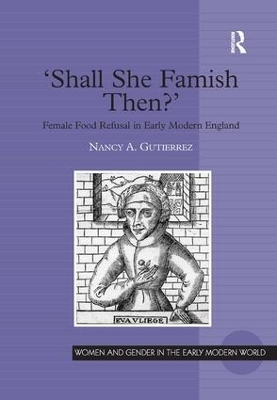
'Shall She Famish Then?'
Ashgate Publishing Limited (Verlag)
978-1-84014-240-2 (ISBN)
Nancy Gutierrez's exploration of female food refusal during the early modern period contributes to the ongoing conversation about female subjectivity and agency in a number of ways. She joins such scholars as Gail Kern Paster, Jonathan Sawday, and Michael Schoenfeldt, who locate early modern ideas of selfhood in the age's understanding of the body and bodily functions, that is, the recognition that behavior and feelings are a result of the internal workings of the body. Exploring the portrayals of the anorectic woman in the work of Ford, Shakespeare, Heywood and others and arguing that the survival of these women undermines regulatory policies exercised over them by those in authority, Gutierrez here demonstrates how female food refusal is a unique demonstration of individuality. The chapters of this book reveal how the common cultural association of women and food manifests itself in the early modern period-not as religious expression, which is the medieval representation, and not as an expression of dysfunctional adolescence and maturation, our own contemporary view, but rather as a trope in which the female body is a site of political apprehension and cultural change. This study is neither a history nor a survey of the anorectic female body in early modern England, but rather individual yet related discussions in which the starved female body is seen to signify certain (un)expressed tensions within the culture.
Nancy A. Gutierrez, The University of North Carolina-Charlotte, USA
Contents: Epigraph; Dedication; Preface; Contexts and methodologies; The public rendering of Margaret Ratcliffe's death; Fasting and prayer in A Woman Killed with Kindness: religious salvation and political resistance; 'Starved; starved': anatomy and food refusal in John Ford's The Broken Heart; 'The Maiden neither eate nor drank one morsel or droppe': miracle maidens as colonial objects; Epilogue: 'What, sir, ... can I do? I have no appetite'; Appendix I: Inscription on the tomb of Margaret Ratcliffe; Appendix II: The deaths of Queen Elizabeth I and Lady Arbella Stuart; Appendix III: Chronological listing of descriptions of Miracle Maidens, published in England 1589-1677; Bibliography; Index.
| Erscheint lt. Verlag | 23.9.2003 |
|---|---|
| Reihe/Serie | Women and Gender in the Early Modern World |
| Sprache | englisch |
| Maße | 153 x 219 mm |
| Gewicht | 460 g |
| Themenwelt | Geschichte ► Allgemeine Geschichte ► Neuzeit (bis 1918) |
| Geisteswissenschaften ► Geschichte ► Regional- / Ländergeschichte | |
| Geschichte ► Teilgebiete der Geschichte ► Kulturgeschichte | |
| Geisteswissenschaften ► Sprach- / Literaturwissenschaft ► Anglistik / Amerikanistik | |
| Sozialwissenschaften ► Soziologie ► Gender Studies | |
| ISBN-10 | 1-84014-240-5 / 1840142405 |
| ISBN-13 | 978-1-84014-240-2 / 9781840142402 |
| Zustand | Neuware |
| Haben Sie eine Frage zum Produkt? |
aus dem Bereich


